Tim Stark Can Never Own Wild Animals Again
An order filed 4/6/2021 in an Indiana courtroom is now barring Stark from ever owning or exhibiting any “exotic or native” animals from here on out. He’s also been ordered to return misappropriated funds. A lot of that money, officials said, came from a baby tiger encounter called “Tiger Baby Playtime.” WIN brought in no more than $100,000 a year, but after offering cub handling, they frequently brought in over a million. The ruling also said Stark had plans to move his “nonprofit” out of Indiana to start something with Jeff Lowe, another “Tiger King” character, in Thackerville, Oklahoma. It fell through, but according to officials, 15-20 animals died in transport.
9/14/2021 Court determined and ordered that “The State has presented clear and convincing evidence to find that Timothy Stark is a dangerous person…” and “Any licence to carry a handgun received by Timothy Stark is hereby suspended pursuant to I.C. 35-47-14-6 (b) and Timothy Stark is hereby enjoined and prohibited from renting, receiving transfer of, or owning or possessing a firearm.” Tim Stark Firearms
How long does it take to stop big cat abuse?
We first reported abuse of big cats and their cubs on this page in 2011, but the case was not brought and resolved to remove the animals from Tim Stark’s possession until 2021. Seem like a long time? Indeed, but it’s typical.
Tim Stark Ordered to Never Own Exotic Animals Again
The proposed Order indicates that the Court concluded that Stark violated the DCSA by representing to consumers that the millions of dollars a year they paid to attend Tiger Baby Playtime and other animal encounter events would be used for charitable purposes when, in fact, the money was regularly used for Stark’s personal gain.
The following relief is ORDERED:
a. Timothy Stark is permanently enjoined from acquiring, owning, and exhibiting any exotic or native animals, including all mammals, birds, reptiles and amphibians.
b. Timothy Stark is required to return to WIN all funds and assets
misappropriated from WIN in an amount and inventory to be determined by the Corporate Receiver, Van T. Willis.
c. Placement of the animals with the Indianapolis Zoological Society as Animal Receiver pursuant to the Court’s September 10, 2020 is deemed permanent and placement of the animals shall remain consistent with the terms of the order.
See the rest here: WIN Exhibit A – Findings and Con
Now the only question is, how long before the judge signs this proposed order and then how long before the assets are actually liquidated? Our experience has been that the justice system moves slowly enough that criminals know they can cash out anything of value before anyone comes knocking.
Tim Stark Wildlife in Need Has USDA License Revoked
2/3/2020 In brief the judge ruled that “Respondents willfully violated the AWA (Animal Welfare Act) on multiple occasions. As set out below, I also find that that Respondents’ business is large, the gravity of such violations was great, there is a history of previous violations, and Respondents did not act in good faith. Therefore, Respondents are ordered to cease and desist from violating the AWA and the regulations and standards issued
thereunder; AWA license number 32-C-0204 is hereby revoked; Respondents are jointly and severally assessed a civil penalty of $300,000 for their violations herein; and Respondent Stark is assessed a civil penalty of $40,000 for his violations herein.
See the order USDA vs Tim Stark Revoke License
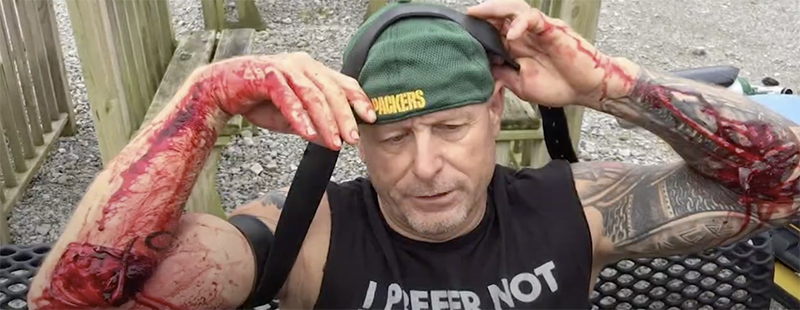
2/14/18 The United States District Court for the Southern District of Indiana granted a preliminary injunction request against roadside zoo Wildlife in Need. The injunction prevents Wildlife in Need from declawing big cats (tigers), separating cubs from their mothers unless medically necessary and from using cubs in public encounters.
The court highlighted some of the case’s background which affected the decision. The judge cited lack of response by the defendants, both in discovery requests and court orders. Both Timothy and Melisa stark refused to sit for depositions, court document said, noting that “the court had very little, if any, evidence to consider on behalf of Defendants.” PETA filed a complaint against Wildlife in Need in, owned by Charlestown residents Timothy L. Start and Melisa D. Stark, in September 2017 for violations of the Endangered Species Act.
A temporary restraining order was issued by the court on October 4, 2017, preventing the defendants from declawing any of their captive lions, tigers and hybrids (“Big Cats”). The roadside zoo has been in the news frequently over the past several years.
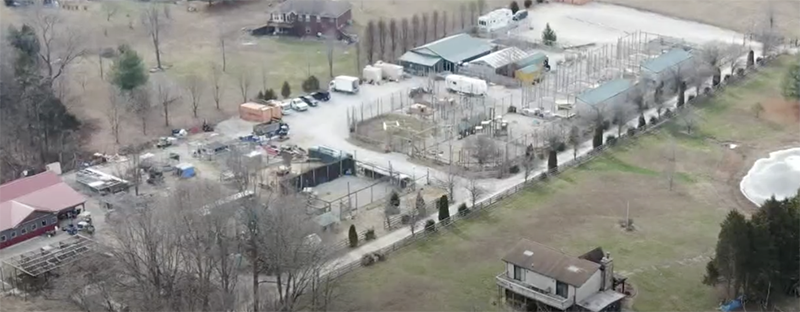
In October of 2017, Wildlife in Need was connected with an FBI wildlife trafficking sweep. In July 2016, the USDA cited Wildlife in Need for 118 animal welfare violations. The 24-page complaint meant the Charlestown business faced up to more than $1 million in fines and possible closure. The US Department of Agriculture tried three times to terminate the owner’s operating license between 2015 and September 2016. PeTA vs Tim Stark Wildlife In Need.
Tim Stark insisted that both of his leopards were dead. Records show he got the cats from Living Treasures Animal Park in New Castle, Pa. They seemed healthy, he recalled, at four months old, but they were “mean as hell.”
Stark said he remembered the day he found one lying on its side, barely breathing. By the time he got to the leopard, it was allegedly dead.
He grabbed its back leg, and it snapped, Stark recalled. That’s when he came to the conclusion that metabolic bone disease had been what made them so mean. But no veterinarian ever examined the animals, USDA records show.
Three or four days after the first leopard died, Stark recalled, was when the second leopard squalled and screamed and darted at him. Stark said he hit it with a baseball bat.
“I hit it numerous times, over and over and over,” he said. “The last time I seen that cat it was (expletive) dead. I hit it with a ball bat numerous freaking times and hit it plenty hard enough to damn kill a full-grown leopard let alone a damn little leopard.”
So unless the leopard came back to life, he said, he doesn’t see how it could have landed in Doris Armstrong’s yard.
http://wfpl.org/the-troubling-record-of-a-southern-indiana-wildlife-refuge/
PETA called Stark’s property a “roadside zoo.” In addition to potential injuries, PETA believes Stark exposes the public to infectious diseases by allowing anyone to hold and pet wild animals.
“Encouraging the public to handle vulnerable cubs roughly and to hit them when they resist is cruel,” PETA Foundation Deputy General Counsel Delcianna Winders said in a statement.
PETA notes Stark pleaded guilty to illegally trafficking an ocelot and has been cited repeatedly by the USDA for animal welfare violations, including keeping a lion and tigers in cages from which they can easily escape, providing bears and tigers with water containing “floating clumps of algae,” and failing to provide animals with any shelter from the heat.
Last year — PETA said citing a USDA inspection report — the zoo had no attending veterinarian and two sick leopards died without receiving any veterinary treatment.
Note: Golden Tabby tigers are merely inbred and crossbred tigers and not a subspecies that serves any conservation program.
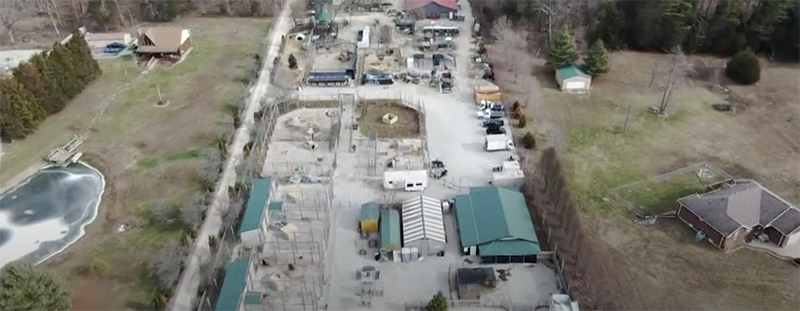
WILDLIFE IN PERIL?:
Former employee, volunteers express concern over animal operation
By KRISTINA GOETZ Kentucky Center for Investigative Reporting | Posted Nov. 23, 2014
CHARLESTOWN — In the wake of a Kentucky Center for Investigative Reporting investigation that found a history of problems at an Indiana exotic animal refuge, current and former members of the organization have come forward to talk about their experiences at the facility.
Meanwhile, legislators who’ve received recent complaints about Wildlife in Need Inc. are looking at potential changes in Indiana law.
KyCIR’s investigation showed Tim Stark’s exotic animal facility in Charlestown has been cited by U.S. Department of Agriculture inspectors for a variety of problems over the past several years, including having enclosures that are not adequate to prevent big cats from escaping, and allowing cubs that are too old and too aggressive to interact with the public.
Former Wildlife in Need employee Travis Ellis, as well as a current volunteer and a former volunteer, portrayed the organization as in distress and disarray. They allege Stark is dismissive of authority, has contempt for veterinarians and uses volunteers who have good intentions but little to no background in animal care.
The volunteers — who provided evidence of their work there — spoke on condition of anonymity for fear of retaliation.
GROWING CONCERN
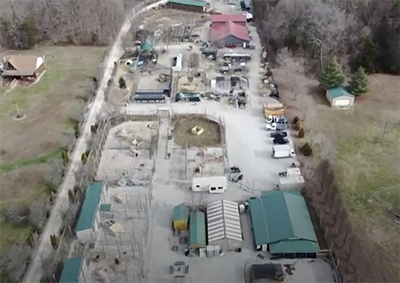 Ellis does not have a degree in animal science but said he grew up around exotic animals and is a licensed falconer in Tennessee. Officials there say Ellis is in compliance with state regulations and has a good track record.
Ellis does not have a degree in animal science but said he grew up around exotic animals and is a licensed falconer in Tennessee. Officials there say Ellis is in compliance with state regulations and has a good track record.
Ellis met Stark when he was animal curator for Kentucky Down Under, he said, and then the two started doing business together. Ellis grew concerned while working for Stark this summer.
“On my side of the tent, we gave people a pretty safe experience with the exception of using that tiger and that bear,” he said of the exotic animal encounter show.
Ellis believes people should be able to interact with exotic animals. He just doesn’t think Stark’s operation is a safe place to do it.
Ellis said he was bitten and clawed by a large tiger this summer. He has photos of the encounter as well.
During the last show of the evening one August night, Ellis told a crowd of about a dozen visitors to get ready for the finale.
“Remain in your seats,” he remembered saying. “Please don’t make loud noises. Don’t attempt to touch her.”
For a moment, he disappeared behind a door but returned with a 250-pound tiger on a woven-knot leash with a leather loop. Just feet away — with no barrier in between — visitors watched the year-old tiger put her paws on two volunteers sitting on the ground, Ellis recalled. He said he tugged the leash to lead the tiger in a circle in order to show off her stripes.
“Once I pulled her away from these girls, she reared up on top of me, grabbed me in my armpit with her teeth and stuck her claws in my back,” he said. “I played it off. The public had no clue what was going on.”
Still feeling the sting of the cat’s teeth, Ellis walked backward out the side door to the tiger’s holding pen.
“She was chewing on me, and she was growling,” he said. “I was still up. I knew if I ever got down it would be bad.”
The tiger hung on, Ellis said, until one of the volunteers smacked her in the nose with a plastic bat.
Ellis scrambled out of the cage, bleeding from four puncture wounds, and slammed the door. He walked back in the tent.
“The public was still sitting there so I had to suck it up and finish the show,” he said.
Ellis claims Stark had little to say after the incident and seemed more upset about what visitors had seen.
“When the cat incident happened, and he wouldn’t take responsibility … that was the final straw,” Ellis said.
He never worked there again. He did not file a complaint with any agency.
Stark did not return an email or a phone message left on Wildlife in Need’s voicemail requesting comment.
In a previous report, Stark said interaction with wild animals is a big part of his operation.
“But the way I look at it, if you’re going to have these animals, they thrive on that interaction. They deserve it, and it’s supposed to be that way,” he said.
One former volunteer said she quit after she found herself crying every day about the animals.
Other volunteers have forged bonds with the animals and don’t want to jeopardize their ability to spend time with them, according to a current volunteer. She questions what she saw there, from dirty cages to overcrowding.
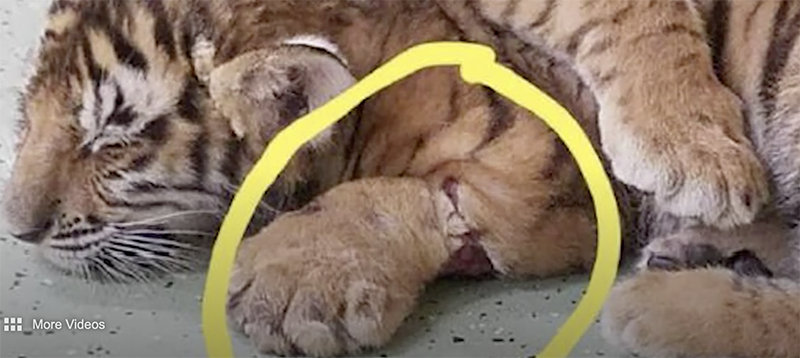
This volunteer was asked over the summer to help with a Tiger Baby Playtime fundraiser event during which patrons paid $25 to play with tiger cubs in a group.
“I was told, ‘If they’re staring, and their ears go up, and they lock onto someone, especially a kid, keep your eye out for that and get in the middle.’ I did not feel comfortable doing that. What you’re telling me is that I’ve got to watch for the tiger to attack someone and stop it? Are you kidding me?”
OFFICIALS TALKING
KyCIR’s investigation of the facility also has caught the attention of several legislators who’ve fielded calls from constituents about Wildlife in Need. A spokesman for Rep. Todd Young, D-Ind., said his office has received letters and phone calls from three constituents who were concerned about both the animals’ welfare and public safety.
“We have been working with the USDA to identify an appropriate point of contact for concerned citizens to reach out to,” spokesman Trevor Foughty said.
On the state level, state Sen. Michael Crider, a Republican who represents District 28 in suburban Indianapolis, said in a phone interview this week that he plans to introduce legislation for the third year in a row that would require a permit for everyone in the state who has certain types of exotic animals.
Currently, a permit is required for people who own these animals as pets. But those like Stark who have United States Department of Agriculture permits to be animal exhibitors are exempt from state regulations. Crider wants dual jurisdiction so Indiana officials have the authority to inspect the property along with the feds. He’s also looking at restrictions other states have implemented.
“This issue is not going away,” said Crider, who retired after 30 years as an Indiana conservation officer. “In fact, in some cases it’s gotten a little bit worse since I first started talking about it. Hopefully we can come up with something that we can get passed, and it will provide for adequate oversight.”
State Rep. Steven Stemler, D-Jeffersonville, said he has been aware of people’s concerns about the facility for some time and would support Crider’s proposed bill. Several constituents called his office last year when they heard a leopard was shot and killed by a neighbor near Stark’s property. USDA officials have yet to definitively determine whether the animal belonged to Stark.
“Personally I think our responsibility is to provide public safety for citizens,” Stemler said. “And whenever there is a question of public safety that is possibly compromised — and in this case with exotic animals — then there should be oversight that is allowed to ensure that safety.”
Rep. Terry Goodin, D-Austin, has received calls from constituents about Wildlife in Need and knows that neighbors have concerns about the facility.
“As I’ve spoken with folks they became frustrated probably with me because I had to tell them openly, hey, the state has no jurisdiction over the facility so there’s nothing really that I can do other than try to work on policy as we move forward.”
Goodin said USDA specs are minimum standards, and he believes the state should build on those. He supports the dual certification Crider is proposing.
http://m.newsandtribune.com/news/wildlife-in-peril-former-employee-volunteers-express-concern-over-animal/article_ff7795b0-71d6-11e4-aff2-1f9e40b25e01.html?mode=jqm
America’s most dangerous pets
The documentary-maker talks about his encounters with a volatile chimp and an amorous baboon
Written By David Brown 30 October 2011
You’d have thought that Louis Theroux would have had enough of cells. Last time we spoke, he’d recently been visiting the high-security inmates at Miami’s mega-jail who stood accused of murder and rape. And now he’s back among cages and pens – only ones that hold tigers, bears and primates. Which experience did he find the most daunting?“I’d much rather be behind bars with a dangerous rapist or a man who’s killed three people than with a chimpanzee,” he admits. “At least I can communicate with the rapist, but I don’t speak chimp. And you just don’t know what they’re going to do.
“I’m afraid that whatever reputation I have for being intrepid will be shattered. I behave like a total wimp around these wild animals.”
In America’s Most Dangerous Pets (airing tonight on BBC2 at 9pm), the non-humans are, thanks to their unpredictable nature, very much the stars of the show. Theroux is once again stateside, this time meeting the owners of animals that you’d normally expect to find in the wilds of Africa. One such encounter involves Cooper, a 120lb chimpanzee who’s on the cusp of sexual maturity at the volatile age of seven.
When Cooper’s owners, Jill and Brad James, guide their pet into the garden, Theroux and his crew observe from indoors. It’s a smart move as Cooper immediately bounds over and smashes a window with his paws: “I don’t think he was trying to attack,” says Theroux. “He also spat at me and the cameraman and threw a barrel at us. But I believe he was trying to say, ‘look, this is my territory. I’m the king here.’
“I felt a bit bad for Cooper, really. I think if you caught him on a good day, he’d be very sweet. We just weren’t willing to take the risk. On the one hand, we could have got a really good sequence if we’d been outside. On the other, he might have bitten off my testicles. So I thought we’d skip it.”
Up close and personal
But is the documentary-maker in danger of downplaying his pluck? After all, on another occasion, Theroux’s suburban safari leads him into the arms of Tatiana, a three-year-old baboon housed at Indiana’s Wildlife In Need & In Deed preserve. “We got along well,” he says.
‘Getting along’ in this case means being pawed, sniffed and screeched at in quite a disconcerting manner, but Theroux has his reasons for thinking that he and Tatiana hit it off:
“Tim Stark, who runs the business, had introduced her as his baboon daughter, so he’d established her in my mind as being a very feminine creature. When she was hugging me quite close and grooming me, it almost felt like a primate-to-primate interaction. The feeling of being understood up to a point was very odd. Having said that, the boom microphone made her go nuts and she’d freak out and climb on it. That was one of my more nerve-racking moments.”
There is, of course, a reason for all this monkeying around. In shedding light on the eccentricities of the country’s private zookeepers and owners of exotic pets, Theroux learns that there are, for example, more tigers in captivity in the US than can be found roaming wild in the whole of Asia.
I wonder what this says about the mentality of people who choose to keep animals that are too volatile and powerful to ever leave their cages for long periods.
“It’s a generalisation, but the men are looking for large, dangerous animals that represent raw physical power and aggression. Controlling and disciplining something ferocious like a tiger gives them a status. With women – and again it’s a generalisation – you notice that they’ve got the chimps and capuchin monkeys, who’re like surrogate children.”Animal instincts
The problem is that all children mature and owners often reach the conclusion that they don’t have the necessary skills to deal with their fast-growing playmates.
“No one is going out there thinking, ‘what I want is a fully-grown chimp that I can only feed through the bars’. They’re after ones like Bubbles that they can cuddle and fool around with. And then six or seven years later, when they aren’t as frisky and fun, people realise that they’ve taken on more than they can handle.”
These unmanageable pets often end up at self-styled “sanctuaries” like the one Theroux spends time at in Oklahoma or at the home of Connie Casey, a breeder and dealer with a colony of 20 chimpanzees. Theroux visits her compound in Missouri after learning that one former resident, a male chimp named Travis, earned notoriety following a 2009 attack on his owner’s friend that left the victim with a lacerated face and severed nose.
“Those accounts really stick in your head and the primates do seem like they’d be happier in larger cages. That’s just my personal view because the atmosphere in Connie’s basement pens was quite prison-like. In fact, one of the strange things is that some of the traits of caged-up chimpanzees are exactly the same as those of caged-up humans.
“At San Quentin [Theroux spent time at the notorious prison for a documentary in 2008], I’d hear a lot about ‘gassing’, which is when prisoners take faeces and urine and fling them at the guards they don’t like. And on one of the last days at the GW Animal Park in Oklahoma, we saw a monkey that had learned to hide faeces in his mouth and if a keeper he didn’t like went near him, he’d spit poop at him.”
Incidents such as these raise an obvious question about whether a “wild” animal can ever truly settle to a life in captivity and it’s one that Theroux asks with his usual quiet tenacity. But, of course, the obvious attraction for the viewer is witnessing how he handles the more physical confrontations.
Whether he’s dodging excretions (human or otherwise) or fending off the advances of amorous baboons, it seems that these days Theroux is now constantly in search of increasingly perilous situations. Is he trying to up the ante with each outing?
“Well, it’s always been a case of pursuing stories that I’m interested in. Here, I actually wanted to reintroduce a humour and lightness that has been absent from some of my more recent projects.” And then he adds finally, “I really don’t consider myself to be a danger freak.”
Tatiana and Cooper, however, may well have a different opinion on the matter.
Louis Theroux: America’s Most Dangerous Pets is on tonight at 9pm on BBC2
‘s-most-dangerous-pets
This video by one of Stark’s relatives shows that two years before the BBC documentary he was still beating up on the bobcat named Tuck. It also showed a number of tigers and lions who did not appear to still be there two years later even though they were obviously youngsters at the time he was having interaction with them.
http://youtu.be/BAHz5BZQL_I
USDA Violations
According to this USDA report, Tim Stark lied about having a veterinarian, had two young leopards die without seeing a vet, failed to keep acquisition and disposition records, among other things.
TIGER CUBS CAUSE FESTIVAL CONTROVERSY
FESTIVAL CO-CHAIRWOMAN SAYS CUBS SHOULDN’T BE EXHIBITED
By Karen Roby/WLKY
BETHLEHEM, Ind. — Thousands of people are expected to flock to Bethlehem this weekend for the annual Autumn on the River festival.
This year, a new exhibit is raising some eyebrows days before the event even starts.A pair of 10 pound, 10-week-old tiger cubs are at the center of this discussion.
The debate is whether the cubs should be allowed at the festival.Event committee members say absolutely, while one woman emphatically says no.Trish Roehm is a longtime resident of Bethlehem. She runs an animal rescue organization out of her home.For years, she has helped organize the Autumn on the River event, but this year, she’s sitting out.”I don’t think it’s a safe environment for children and, as for education, it’s sending the wrong message to the public that these are cute, cuddly animals. They aren’t. They are wild animals,” Roehm said.Roehm doesn’t want the tigers at the annual gathering.
Jason Vicks/WLKY.com
Wildlife in Need, Wildlife in Deed
Tim Stark owns an animal refuge in Charlestown. He applied for booth space at the Autumn on the River festival.Stark’s plan is to give people the opportunity to take pictures with the Bengal tiger cubs.”I control the kittens. I control it. Its nails are clipped so they don’t scratch anybody. I am on the spot in case anything happens. They are just babies, 10-week-old babies,” Stark said.
Stark’s house is home to the Wildlife in Need, Wildlife in Deed sanctuary. His nonprofit organization works solely on donations.”All these guys were raised here, they went through the photo shoot program, that’s how we fundraise. I have someone that is protesting that? I am in no way shape or form going to endanger anybody,” said Stark.Roehm said that despite her concern, the festival co-chairman told Stark it would be fine for him to set up his photo booth at the event.Stark said as an American, it is his right.”I carry a USDA license to do what I do, to raise, breed and exhibit them,” Stark said.David Abbott, the co-chairman of the event, said that as long as Stark produces his certificate of insurance and information about the cubs’ immunizations, then he is fine to set up his booth at the event.Stark said he has been doing this for years.Last weekend, more than 700 pictures were taken with the cubs at the Harvest Homecoming Festival in New Albany.Stark said that he has never had a problem with the tiger babies in public.
The Autumn on the River Festival is Saturday and Sunday in Bethlehem.
Go to the link to see video of Tim Stark being stupid with big cats. Notice he is carrying what looks like a golf club inside the cage with the cats. You can be sure he isn’t teaching them to swing.


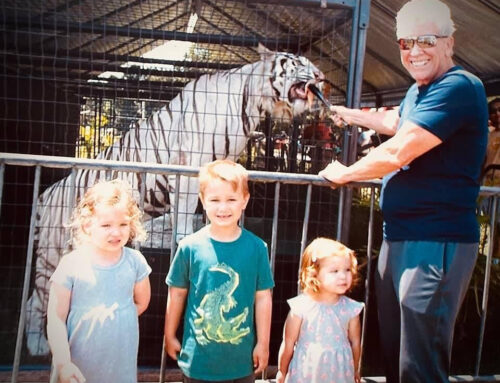
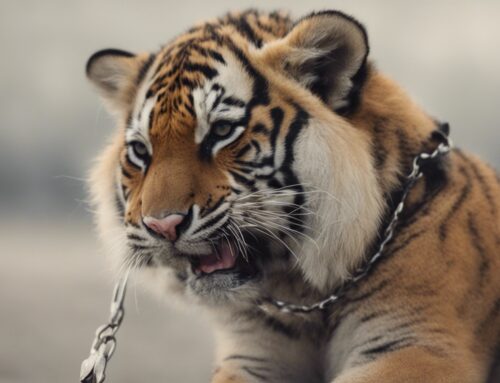

Leave A Comment
You must be logged in to post a comment.